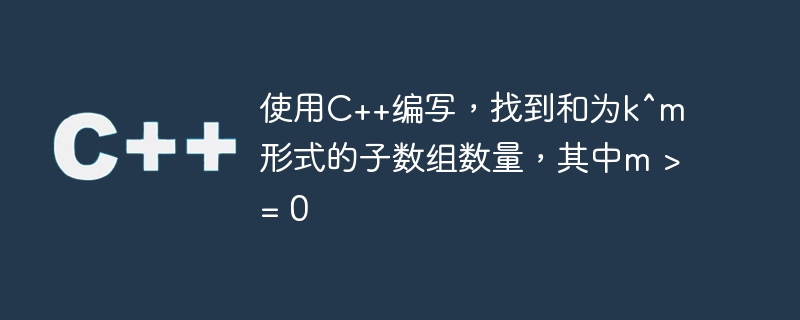Home >Backend Development >C++ >Written in C++, find the number of subarrays whose sum is k^m, where m >= 0
Written in C++, find the number of subarrays whose sum is k^m, where m >= 0
- 王林forward
- 2023-09-06 09:45:02647browse

In this article, we will explain everything about finding the number of subarrays whose sum is k^m, m >= 0 in C. Given an array arr[] and an integer K, we need to find the number of subarrays with sums of the form K^m where m is greater than or equal to 0, or we can say we need to find the number of subarrays with sums of the form K^m The sum of the quantities is equal to some non-negative power of K.
Input: arr[] = { 2, 2, 2, 2 } K = 2
Output: 8
Sub-arrays with below indexes are valid:
[1, 1], [2, 2], [3, 3], [4, 4], [1, 2],
[2, 3], [3, 4], [1, 4]
Input: arr[] = { 3, -6, -3, 12 } K = -3
Output: 3There are mainly two methods-
brute force attack
In this method we will loop through all sub-arrays and check if they are K or not; if so , then we increment the count.
Example
#include <bits/stdc++.h>
#define MAX 1000000
using namespace std;
int main(){
int arr[] = {2, 2, 2, 2}; // given array
int k = 2; // given integer
int n = sizeof(arr) / sizeof(arr[0]); // the size of our array
int answer = 0; // counter variable
for(int i = 0; i < n; i++){
int sum = 0;
for(int j = i; j < n; j++){ // this will loop will make all the subarrays
sum += arr[j];
int b = 1;
while(b < MAX && sum > b) // k^m Max should be 10^6
b *= k;
if(b == sum) // if b == sum then increment count
answer++;
}
}
cout << answer << "\n";
}Output
8
However, this method is not very good because the time complexity of the program is O(N*N*log (K)), , where N is the size of the array and K is the size of the array. An integer given by the user.
This complexity is not good because this complexity can be used for higher constraints because if the constraints are large it takes too much time to process so we will try another approach, So that we can use this program to achieve higher constraints.
Efficient method
In this method, we will use prefix sum and mapping to reduce processing, thereby greatly reducing time complexity.
Example
#include <bits/stdc++.h>
#define ll long long
#define MAX 1000000
using namespace std;
int main(){
int arr[] = {2, 2, 2, 2}; // The given array
int n = sizeof(arr) / sizeof(arr[0]); // size of our array
int k = 2; // given integer
ll prefix_sum[MAX];
prefix_sum[0] = 0;
partial_sum(arr, arr + n, prefix_sum + 1); // making prefix sum array
ll sum;
if (k == 1){
// we are going to check separately for 1
sum = 0;
map<ll, int> m;
for (int i = n; i >= 0; i--){
// If m[a+b] = c, then add c to the current sum.
if (m.find(prefix_sum[i] + 1) != m.end())
sum += m[prefix_sum[i] + 1];
// Increase count of prefix sum.
m[prefix_sum[i]]++;
}
cout << sum << "\n";
}
else if (k == -1){
// we are going to check separately for -1
sum = 0;
map<ll, int> m;
for (int i = n; i >= 0; i--){
// If m[a+b] = c, then add c to the current sum.
if (m.find(prefix_sum[i] + 1) != m.end())
sum += m[prefix_sum[i] + 1];
if (m.find(prefix_sum[i] - 1) != m.end())
sum += m[prefix_sum[i] - 1];
// Increase count of prefix sum.
m[prefix_sum[i]]++;
}
cout << sum << "\n";
}
else{
sum = 0;
ll b;
map<ll, int> m;
for (int i = n; i >= 0; i--){
b = 1;
while (b < MAX){ // we are not going to check for more than 10^6
// If m[a+b] = c, then add c to the current sum.
if (m.find(prefix_sum[i] + b) != m.end())
sum += m[prefix_sum[i] + b];
b *= k;
}
m[prefix_sum[i]]++;
}
cout << sum << "\n";
}
return 0;
}Output
8
Conclusion
We solved a problem to find the number of subarrays whose sum is of the form k^m, where m >= 0, the time complexity is O(nlog(k)log(n)) time complexity. We also learned a C program to solve this problem and a complete way to solve this problem (normal and efficient). We can write the same program in other languages such as C, java, python and other languages. Hope this article is helpful to you.
The above is the detailed content of Written in C++, find the number of subarrays whose sum is k^m, where m >= 0. For more information, please follow other related articles on the PHP Chinese website!
Related articles
See more- C++ compilation error: A header file is referenced multiple times, how to solve it?
- C++ compilation error: wrong function parameters, how to fix it?
- C++ error: The constructor must be declared in the public area, how to deal with it?
- Process management and thread synchronization in C++
- How to deal with data splitting problems in C++ development

